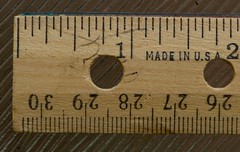Right now, I’m sitting in my comfy chair in the corner by the window of my home office and drinking a freshly brewed cup of coffee from my favorite mug. The dog has done her security patrol of the perimeter, deemed me to be safe from the local deer and bunny rabbits, and has settled in for her morning nap. I’m having one of those, “This is why I’m doing this,” kind of moments and it’s nice.
As a tax person who specializes in small businesses, I get asked a lot of questions about different business practices–Should I set up an LLC? I always answer, “That depends.” Should I lease a car or buy it? That depends. Should I set up as a sub-chapter S corporation? That depends. You get the picture. But when people ask me about a home office I always say, “Yes! Every small business owner who files a schedule C should have a home office.” My answer has nothing to do with the comfy chair and coffee either. As usual with me–it’s all about the money.
A home office is good for your tax return. First, you get to use a portion of your living expenses (that you would already be paying anyway) to offset your self employment income. Remember–your self employment income is taxed at 13.2% more than your regular income tax so even something like your mortgage interest-which is already deductible, is a better deduction when it goes against your self employment income. Kaching!
a home office is foThe other reason you want r your mileage. Yes, you read that right–you want the home office deduction to claim mileage. Here’s the deal–let’s say you’re a contractor, you drive to jobs all over town. You probably put close to 20,000 miles on your truck a year for business. You claim that on your tax return and get audited. (Side note: claiming exactly 20,000 business miles on your tax return will get you audited it’s a red flag.) Anyway, you go through the audit process and the IRS disallows all 20,000 miles because you’re commuting to those job sites from your home and commuting miles are not tax deductible. That’s over $3800 worth of tax money that you just lost right there. Add the fines and penalties and you’re well over 5 grand in tax debt.
But if you had a home office–all of that mileage becomes deductible because ou’re traveling from your office to a job site.
But what if I don’t really have a home office? Seriously, you need to set something up. It doesn’t have to be a whole room–it can be a corner of a room (like my comfy chair spot although most people have a desk or table.) You can’t just say you have a home office on your tax return and not really have one. (You’ve heard of fraud, right?) Be be realistic. If you have a small business–you’ve got something–files, or a computer, or make up, or something–and it needs to be put someplace. You need a spot to make phone calls from, pay the business bills, do your adminsitrative work–that’s your home office.
Aren’t I more likely to get audited if I claim a home office? To be honest, I keep hearing that, but my experience says no. The only time I’ve seen home office expenses audited was when they really were wrong and it was part of a broader audit. (Oh yeah, and when I redid those numbers correctly the taxpayer got a bigger home office deduction.) Be honest about it and you’ve got nothing to worry about.
But what if I have a real office in a business building that I go to every day? Can I still have a home office? Yes you can. You make your home office your administrative office. Like I said, pay bills, balance the business check book. I never meet clients in my home office, they always come to my “business office” location. My business office doesn’t prevent me from having an “administrative” office at home.
If you’d like more information about claiming a home office, try this link: http://robergtaxsolutions.com/2010/09/can-you-claim-a-home-office-deduction/ It has more information about the rules and what the IRS is looking for. But seriously, if you’re a sole proprietor, you need a home office.


